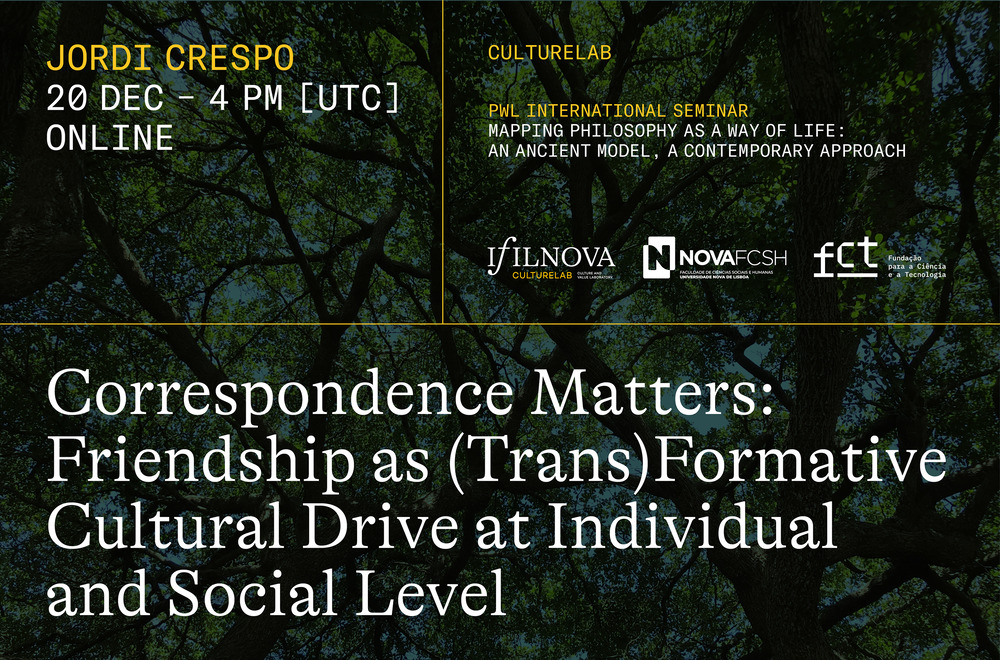Jordi Crespo

20 December | 4 PM (UTC)
11 AM New York
1 PM Brasilia
4 PM Lisbon
5 PM Berlin
For other locations click here.
Abstract
According to a long-standing view, philosophical enterprise started in Western civilization with the emergence of texts: the practice of writing is deemed to be the context and the pretext giving rise to philosophical reflection. While the ties between writing and philosophy areclearly evident, it is not less true that philosophy experienced a gradual shift from a dialogical and oral activity towards a monological and written practice, this being an important point of contrast between the format that philosophy took in Antiquity and in Modern and Contemporary times. Likewise, in ancient times friendship involved an array of aspects no longer extant neither in Modern nor in Contemporary times; yet, the point is that friendship is to be found at the basis of philosophical endeavour: this becomes plain from the etymology of the same very word, and from the fact that friendship is the type of human relationshipwhere the performative goal of philosophy operates to the full. In the first instance we shall delve into these two prefatory assumptions. Afterwards, our aim is to cast some light upon the epistolary genre because, although letters may have been the commonest way to bridge physical and spiritual distance for centuries, due to current virtual forms of communication, transmission, and information storage, letters are about to disappear. Moreover, it is in private correspondence that texts and friendship go hand in hand. Thus, by taking letters from different historical periods into consideration, it will be brought out that in the epistolary literature friendship deploys, at least, in two intertwined ways: 1) at individual level, friendship yields a guide for living. 2) At a social level, friendship serves as a conducive means to instruct someone who holds (or eventually will) political power in the principles of power exertion over the bodies and souls of others.
Bio
Jordi Crespo Saumell is a Ph.D. in Philosophy, Epistemology, and History of Culture (Unica, 2017). His dissertation revolved around the Anonymus Londiniensis, a papyrus of medical content in Greek from the 1st century CE. Before that, he had coursed other related studies to this field: a MA in Ancient Philosophy (UCD, 2013); a MA in Classics (UCM, 2012); and a MA in History of Religions (UAB, 2005). In addition to this, he has worked for four terms as an associate lecturer of different subjects in Philosophy at the Department of Humanities for the Pompeu Fabra University of Barcelona. The most part of the research he has conducted to the moment falls in the fields of philosophy and medicine in Antiquity. However, his interests go beyond the Antiquity and prove also broader than the aforementioned disciplines: evidence of that are the research lines of the clusters in which he takes part: “Influence of Greek Ethics on Contemporary Philosophy” (AUM) and “Eidos: Plato and Modernity” (UB). This combination of interests in particular was precisely what pushed him to get close to Philosophy as a Way of Life (PWL), and to realise that it is into this trend where he feels intellectually comfortable and where he is willing to direct his effort.
Registration required via email to mapping.pwl@gmail.com.
Event supported by the Foundation for Science and Technology (Fundação para a Ciência e para a Tecnologia) of the Portuguese Ministry of Education and Science within the scope of the CultureLab research project “Mapping Philosophy as a Way of Life: An Ancient Model, A Contemporary Approach” (2022.02833.PTDC).

